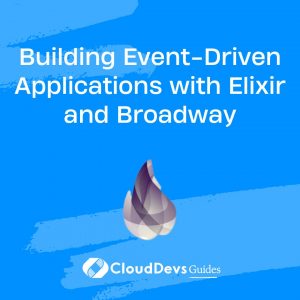Building Event-Driven Applications with Elixir and Broadway
In the realm of modern software development, event-driven architectures have emerged as a powerful paradigm for building scalable, resilient, and responsive applications. Leveraging the strengths of Elixir, a functional programming language known for its concurrency and fault tolerance, alongside Broadway, a robust data processing library, developers can craft event-driven applications that meet the demands of today’s dynamic digital landscape.
Understanding Event-Driven Architecture
Event-driven architecture (EDA) revolves around the concept of events, which represent significant changes or occurrences within a system. These events can be anything from user actions, system notifications, or data updates. In an event-driven system, components communicate asynchronously by producing and consuming events, enabling loosely coupled and highly scalable architectures.
Why Elixir?
Elixir, built on the Erlang Virtual Machine (BEAM), is uniquely suited for event-driven programming. Its lightweight processes, known as Erlang Actors or “Elixir Processes,” enable massive concurrency without compromising performance. Furthermore, Elixir’s fault-tolerant design ensures that applications remain resilient even in the face of failures.
Introducing Broadway
Broadway, an Elixir library inspired by Apache Kafka and AWS Kinesis, simplifies the development of event-driven pipelines. It provides abstractions for building data processing workflows, handling backpressure, and scaling horizontally across multiple nodes. Broadway seamlessly integrates with Elixir’s supervision trees, enabling automatic restarts and supervision of data processing stages.
Building Event-Driven Applications with Elixir and Broadway
Let’s dive into how developers can harness the power of Elixir and Broadway to construct event-driven applications:
1. Data Ingestion:
The first step in building an event-driven application is ingesting data from various sources. Broadway’s sources support a wide range of inputs, including message queues, databases, and external APIs. Developers can leverage this flexibility to consume events from sources like Kafka, RabbitMQ, or even custom GenStage producers.
2. Data Transformation:
Once data is ingested, it often requires transformation to suit the application’s needs. Broadway’s processors enable developers to perform complex data transformations in a fault-tolerant and scalable manner. Whether it’s enriching data, filtering events, or aggregating streams, Broadway’s processor functions make it easy to manipulate data as it flows through the pipeline.
3. Data Enrichment:
In many scenarios, enriching incoming data with additional context or metadata is crucial. Elixir’s concurrency primitives, combined with Broadway’s processing stages, allow developers to parallelize data enrichment tasks efficiently. Whether it’s querying external services, performing database lookups, or applying business rules, Elixir’s lightweight processes ensure optimal performance and responsiveness.
4. Data Output:
Finally, processed data needs to be delivered to its destination, whether it’s a database, cache, or external service. Broadway’s sinks provide robust abstractions for writing data to various output sources while handling errors and retries gracefully. Developers can choose from existing sink implementations or build custom sinks tailored to their specific requirements.
Real-World Examples
To illustrate the power of building event-driven applications with Elixir and Broadway, let’s explore some real-world use cases:
1. Real-Time Analytics:
Imagine a streaming analytics platform that ingests clickstream data from millions of users in real-time, analyzes user behavior, and generates actionable insights. By leveraging Elixir and Broadway, developers can build a scalable and fault-tolerant analytics pipeline capable of processing high volumes of streaming data with low latency.
2. IoT Data Processing:
In the Internet of Things (IoT) space, devices generate vast amounts of sensor data that require processing and analysis in real-time. Elixir and Broadway provide an ideal platform for building IoT data processing pipelines that can handle the complexities of streaming data ingestion, transformation, and storage at scale.
3. Financial Transaction Processing:
Financial institutions deal with massive volumes of transaction data that need to be processed accurately and efficiently. By employing Elixir and Broadway, developers can build event-driven systems capable of processing financial transactions in real-time while ensuring fault tolerance, data integrity, and regulatory compliance.
Conclusion
In conclusion, building event-driven applications with Elixir and Broadway offers a compelling solution for modern software development challenges. By harnessing the concurrency, fault tolerance, and scalability of Elixir alongside the flexibility and robustness of Broadway, developers can construct highly responsive, resilient, and scalable systems that meet the demands of today’s digital landscape.
External Links for Further Reading:
- [Elixir Official Website](https://elixir-lang.org/)
- [Broadway GitHub Repository](https://github.com/plataformatec/broadway)
- [Introduction to Event-Driven Architecture](https://www.redhat.com/en/topics/integration/what-is-event-driven-architecture)
Table of Contents









